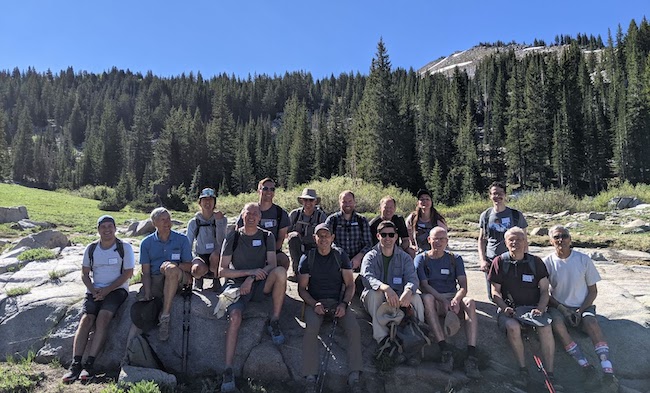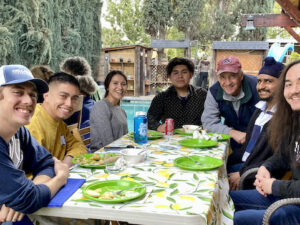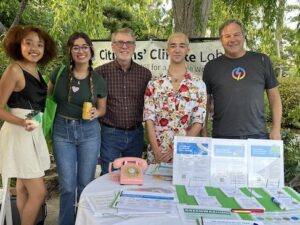
CCL Utah volunteers on a hike with Republican Congressman John Curtis (front center).
By Steve Valk
Immediately after the 2020 election, Tom Moyer sensed that the coming year, with a new administration and Congress, would present the best opportunity in over a decade to push carbon pricing over the finish line. The chances of that happening, he knew, would be greatly enhanced if a policy like carbon fee and dividend had bipartisan backing.
Moyer, the Utah State Coordinator for Citizens’ Climate Lobby, had his sights set squarely on Senator Mitt Romney, who’d signaled that he was open to supporting a carbon tax to bring down greenhouse gas emissions.
So, what would it take to get Romney to the next level, like putting his name on a bill to price carbon?
Moyer seized on the idea of getting endorsements for carbon fee and dividend from Republican officials in Utah. “We know Romney likes the policy. We just have to show him some support in the state.”
Thus began a months-long endeavor that eventually enticed endorsements from 25 Utah Republicans, most of them members of the state legislature. They expressed their support for carbon fee and dividend in an op-ed published in the Deseret News on June 4:
“We support a carbon dividends approach that puts a fee on carbon emissions and returns all the money to the American people in dividend checks. This approach does not require heavy-handed government oversight. The fee gives the markets an incentive to move to cleaner technologies, while the dividend protects families from the effect of higher energy prices.”
Quest for endorsements begins
At the outset, Moyer knew that securing these endorsements would require a willingness to take bold action.
“I think we all recognize this is the time to put up or shut up, and it’s the time to take chances. It’s the time to call in favors. It’s the time to make asks that we otherwise would save until a more opportune time, because it’s got to happen now.”
The first ask, back in November, was with State Representative Ray Ward. “He said ‘yes,’ as I suspected he would. He’s a strong environmental Republican and a carbon pricing supporter.”
With the first endorsement secured, the next task was to find other Republicans to join Ward. “We put the word out to CCL members in state districts where we thought we might have a chance. We asked people to ask their legislators to endorse the Energy Innovation Act, and we didn’t get anything for a while,” Moyer said.
One of those CCL volunteers, Charles Ashurst, happened to be the neighbor of former State Rep. Fred Hunsaker, who loved the idea and committed to endorse in February. Hunsaker said to Moyer, “We need to do something, and we need to step up and we need to be for things and not just against things.“
Months went by before a third endorsement came through. Disappointingly, a lot of officials that CCL volunteers thought were likely to say “yes” declined. “Just all sorts of basically hedging excuses, like the message is too risky.”
Time to ‘shop it around’
Their tenacious persistence and patience paid off in April when, after many constituent requests, two more state representatives came aboard and agreed on publishing an op-ed. The effort started taking off as the two said they would “help shop it around” to other legislators.
At that point, Moyer said, “Okay, we’re a go. This is going to happen.” He and other CCL members helped draft an op-ed that everyone was happy with, “and then it was time to hit the gas pedal.” Having four Republican signers and an op-ed draft in hand made the process for enrolling others easier.
Some signers were people CCL members had built relationships with over the years with activities like mountain biking. This was the case with State Representative Jeff Stenquist, who ended up being the fifth signer after the first endorser, Ray Ward, asked him to sign on. Both have now expressed interest in introducing a carbon pricing resolution in the Utah legislature.
The more people who signed on, the easier it became to get new signers because of the safety-in-numbers factor. With six signers on board, Moyer turned to his own state representative, Kera Birkeland, who happened to be friends with a member of the Young Conservatives for Carbon Dividends. “It was like two minutes to get a yes… with an exclamation point!”
The big breakthrough came when former gubernatorial candidate and Utah businessman Jonathan Johnson agreed to sign on. Johnson was among the more conservative of the signers, “the libertarian bent of the Republican Party,” as Moyer put it.
“And then he became the biggest supporter of any of them. He said, ‘This is great. Who else would you like to get?’ He gave us a list of other names, many of which are also on the conservative side of the Republican Party.”
When the list of signers started to balloon, Moyer worried that leadership in the Utah House might try to shut it down. One of the signers said he’d feel more comfortable if they ran it by the leaders, which he did. When he got no resistance, all systems were go.
‘I really like the message’
As the op-ed draft circulated, it became clear that Republicans were eager to engage in the climate issue and offer solutions. After seeing the piece, one former state representative wrote to Moyer and said, “I really like the message of advocating for something rather than against everything in the realm of environmental concerns. I have always made the argument that the concept of conservation is inherent in conservatism—but conservatives have been abysmal at making that point.”
The op-ed gave voice to Republicans like this:
“We need to do more than just oppose bad ideas. We need to offer good ones that are effective and consistent with our values. Policies will be better if they are built on conservative principles of accountability, transparency, free markets and limited government. Republican involvement can ensure that those principles make it into legislation.”
After it was published, other signers of the op-ed enthusiastically tweeted about it, like this post from State Rep. Jeff Stenquist:
I’m proud to sign on to this op-ed.
“Utah has a long tradition of finding common ground and practical solutions to difficult problems…We also value stewardship of our natural resources…It’s time for us to…offer solutions that drive growth and cut emissions.” #utpol #utleg https://t.co/nR9W1clTfh
— Rep. Jeff Stenquist 🇺🇸🇺🇦 (@JeffStenquist) June 4, 2021
Former State Rep. Becky Edwards echoed the sentiment about Republicans needing to be more engaged on the climate issue:
Climate politics need Republican engagement… but for too long we have left these topics to others. We need to hear more about innovation and American leadership. https://t.co/JgIOVPcyQq
— Becky Edwards for Utah (@beckyforutah) June 9, 2021
In a meeting a few weeks ago, Moyer said Romney’s staffers had all read the piece and were impressed by the number of signers and the people who signed. The op-ed was mentioned in a New York Times story about Republican engagement on climate change.
A template for state-level support
The potential impact of these Republicans’ endorsements and willingness to go public with an op-ed in the Deseret News can’t be overstated. As we saw with the Growing Climate Solutions Act recently, policies that have bipartisan support get fast-tracked for passage. CCL Utah has provided a template for other climate advocates to generate support for carbon pricing among Republicans at the state level that can influence GOP members of Congress.
CCL has always maintained that a fee on carbon with revenue given to households can be the common ground between Republicans and Democrats for solving climate change. The success in Utah bears that out.





